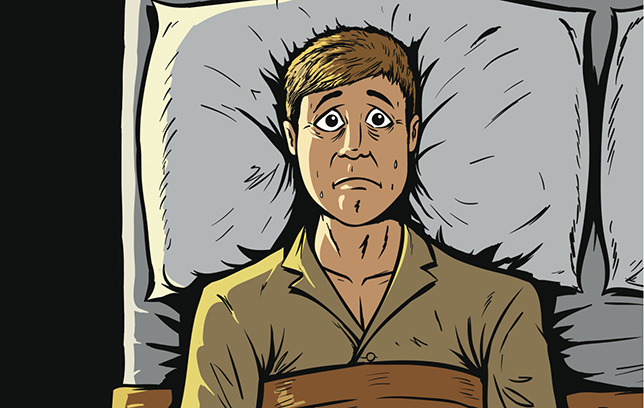Beyond the obvious sleep-wreckers like bad hotel beds and booze, a lot of things stand between you and a good night’s rest. Here are ten surprising factors that might be keeping you from catching a solid 8 hours a night.
The Better Man Project
Sleep Saboteur #1: A Hot Bed
Sure, during sex you want things to heat up. The rest of the time, though, you should keep your cool. Keeping your thermostat between 68 and 74F promotes solid slumber, says psychiatrist and sleep specialist Tracey Marks, M.D., the author of Master Your Sleep.
Your body clock regulates your core temperature, and its fluctuations tell you when to sleep and when to wake up, she says.
“You’re coolest in the middle of the night, when sleep is deepest.” If you’re too warm, your internal alarm assumes it’s time to rise, and sleep becomes fitful.
If the idea of cooling your entire house gives you nightmares, consider installing a “slave thermostat” to regulate only your bedroom temp. You can also tackle the problem lying down by using 400-thread-count cotton sheets.
“It’s the opposite of memory foam, which retains your body heat,” says W. Christopher Winter, M.D., medical director of the sleep medicine center at Martha Jefferson Hospital in Charlottesville, Virginia. “The gel maintains a surface temperature that’s lower than the mattress’s, creating cooler contact points.”
Sleep Saboteur #2: Money Worries
“Decreased financial resources leads to worry over paying bills, and you may be required to work more,” Dr. Marks says. “The physical and mental overload increases activity in your brain, causing you to ‘think yourself awake.’”
This is when frustrated insomniacs often resort to distraction tactics, such as television. But even though watching TV may calm your racing mind, the flickering light will interrupt secretion of the sleep hormone melatonin, causing a less-than-restful night.
You’ll need to wage chemical warfare. Stress triggers the release of the hormone cortisol, which has been linked to insomnia, says Dr. Marks. Endorphins, the brain’s “happy chemicals,” have a relaxing effect.
Sex or masturbation causes a rush of endorphins, but there’s an even quicker fix: humor. Try watching a funny 3-minute video on YouTube, Dr. Marks suggests.
If you still wake up fretting in the night, try counting sheep. Seriously. Counting occupies space in your brain’s “articulatory loop,” the part that processes ongoing information, according to a 2010 study review in Insomnia and Anxiety. The loop’s capacity is limited, so the fluffy guys crowd out unwanted thoughts.
Sleep Saboteur #3: Hellish Heartburn
If daytime heartburn is a pain, a midnight attack is a nightmare.
“It can stir you awake, often multiple times throughout the night,” says William Orr, Ph.D., a clinical professor of medicine at the University of Oklahoma.
Symptoms of gastroesophageal reflux disease, or GERD, occur when the valve between your stomach and esophagus malfunctions, allowing acid to seep past. Some patients wake up choking or coughing, while others don’t consciously rouse but still feel drained in the morning. People with nighttime heartburn often wake up with a bitter taste in the mouth or a sore throat.
Surprising Causes of Heartburn
Beyond avoiding oversize meals and spicy food before bed, try a sleeping wedge to elevate your head a few inches above the rest of your body.
“It’s a lot easier for acid to creep out of your stomach and into your esophagus if you’re lying flat,” Dr. Winter says.
If you like to sleep on your side, curl up on your left side.
On you right side, the sphincter between your stomach and esophagus may stay open longer, letting acid flow freely, a study review in the Archives of Internal Medicine found.
Sleep Saboteur #4: A Squirming Bedmate
A limb-flinging, snoring, blanket-stealing partner will undeniably disrupt your sleep, but your bedmate may also be guilty of subtler offenses. Your partner’s teeth grinding, frequent bathroom trips, or even body heat can also spoil your slumber, says Dr. Winter.
If she tosses and turns, top your mattress with memory foam, which won’t shift with her body.
If that’s too warm, choose a mattress with pocket coils; these aren’t tied together, so movement won’t create a chain reaction.
If she’s a kicker, ask her to sleep on her back or stomach. “On her back, it becomes more of a toe-tapping movement,” says Dr. Winter.
Or consider “sleep vacations”—sleeping apart a few nights a week. “You’re ensured sound sleep, and there’s no guilt, because these are set nights,” Dr. Winter says.
Sleep Saboteur #5: You Read Non-Fiction
Stick to made-up stories before bed, advises sleep expert Michael Breus, M.D. Having a heated conversation prior to pillow-time is known to keep you up, but the same can go for what you’re reading.
“Non-fiction—self-help books, books about finance—may be too much about yourself,” says Dr. Breus.
Emotional, absorbing topics can also keep you awake, he adds.
With fiction, on some level you know what you’re reading is imaginary, which removes the emotional connection, he explains.
Sleep Saboteur #6: Bad Air
Love those pretty red sunsets in your town? Many times they’re caused by air pollution, which may be seeping into your home and keeping you awake long after the sun dips below the horizon.
According to a Harvard study, poor air quality can increase your risk of disordered sleep breathing—repeated lapses in respiration during the night.
“Air pollution increases inflammation. This may make your throat more likely to close and your oxygen levels to fall during sleep,” says study author Susan Redline, M.D., M.P.H. The condition affects up to 17 percent of adults.
HEPA filters can help, but only if you choose the right one. Standard HEPA filters offer a “minimum efficiency reporting value” (MERV) of 1 to 4. But you should upgrade to a higher-efficiency MERV 13 filter that also traps tinier particles (which can travel deeper into your lungs), says Bill Weinberg, the former president of AMHAC, a heating and air-conditioning company in Eastchester, New York.
If you have allergies or asthma, consider a GAPA filter, a more powerful filter that uses electrostatic energy to attract fine particles, he says.
Sleep Saboteur #7: You Pop B Vitamins at Night
Think of B vitamins as energizers: They help form red blood cells and assist in the process of making energy from the food you eat. When the vitamins are doing their job correctly, they also regulate your sleep schedule.
If you take them at night, though, they can keep you up. Leafy green vegetables, beans, fish, and poultry are usually packed with B. But if you’re taking a supplement, make sure to pop it in the A.M.
Sleep Saboteur #8: She Comes, You Don’t
Sometimes sex sets you up perfectly for a good night’s sleep. After you do the deed, your body is relieved of stress, and your brain surges with oxytocin and serotonin, which have powerful sleep-inducing effects.
But Men’s Health sleep advisor W. Christopher Winter, M.D. says that recently, some of his patients have complained about one partner climaxing and then conking out before returning the favor. That could keep the other partner up.
Why? If you don’t quite get there, your blood is still flowing, there’s a buildup of pressure, and your brain is saying, ‘sex’—not ‘sleep’.
Sleep Saboteur #9: You Share a Bed with Your Cat
A study from the Mayo Clinic recently found that 10 percent of patients reported their pets disturbing their sleep at night. Common annoyances included snoring, whimpering, wandering around the house, and begging to go outside.
But Dr. Breus says that more than any other animal, cats seem to be the most disruptive.
“Dogs usually sleep through the night. Cats like to move around more and are much more nocturnal,” he says.
Since you have to worry about more than just small paws walking on your face, keep your critter outside the bedroom to protect your shuteye.
Sleep Saboteur #10: Smartphone Addiction
E-mailing and checking sports scores are all stimulating activities that prevent you from winding down, Dr. Winter says.
The worst part? The Pavlovian response to a “new message” sound. “If you hear the tone, it’s irresistible,” he says.
Even a quick check wakes your brain and your body. “It’s a light box that you’re shining into your eyes at 11 p.m.,” Dr. Winter says. “Your body is seeing a strong trigger that it’s daytime.”
Break your addiction by using a passcode on your phone and changing it once a week, suggests William Pollack, Ph.D., an associate clinical professor of psychiatry at Harvard medical school.
This forces you to pause before accessing the phone, breaking a behavior that’s often on autopilot. You’ll mentally register what you’re doing, which helps control the habit.
Check the phone once an hour or so before bed, and then cut yourself off, he says.


















